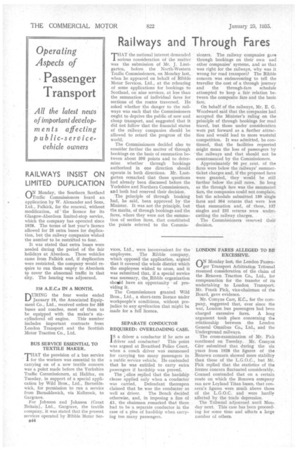Railways and Through Fares
Page 62

If you've noticed an error in this article please click here to report it so we can fix it.
?TIIAT the national interest demanded I serious consideration of the matter was the submission of Mr. J. Lustgarten, before the North-Western Traffic Commissioners, on Monday last, when he appeared on behalf of Ribble Motor Services, Ltd., at the rehearing of some applications for bookings to Scotland, on nine services, at less than the summation of individual fares for sections of the routes traversed. He asked whether the danger to the railways was such that the Commissioners ought to deprive the public of new and cheap transport, and suggested that it did not follow that the financial status of the railway companies should be allowed to retard the progress of the world.
The Commissioners decided also to consider further the matter of through bookings on the basis of summation between about 300 points and to determine whether through bookings authorized in one direction should operate in both directions. Mr. Lustgarten remarked that these questions had already been discussed before the Yorkshire and Northern Commissioners, an.t both had reserved their decision.
The principle of through booking had, he said, been approved by the Minister. It was not the principle, but the merits, of through bookings and the fares, where they were not the summation of section fares, that constituted the points referred to the Commis sioners. The railway companies gave through bookings on their own and other companies' systems, and as that was right for the railways, why was it wrong for road transport? The Ribble concern was endeavouring to tell the traveller the cost of a through journey and the through-fare schedule attempted to keep a fair relation between the composite fare and the basic fare.
On behalf of the railways, Mr. E. G. Woodward said that the companies had accepted the Minister's ruling on the principle of through bookings for road travel, but those under consideration were put forward as a further attraction and would lead to more wasteful competition. It was admitted, he continued, that the facilities requested might mean the loss of passengers by the railways and that should not be countenanced by the Commissioners.
Approximately 96 per cent, of the fares were below the railways' summerticket charges and, if the proposed fares were granted, they would be still
further below the rates. So long as the through fare was the summated fare, the companies could not complain, but the schedule submitted 139 single fares and 304 returns that were less than summation and, of these, 137 singles and 231 returns were underl cutting the railway charges. The Commissioners reserved their decision.




































































































